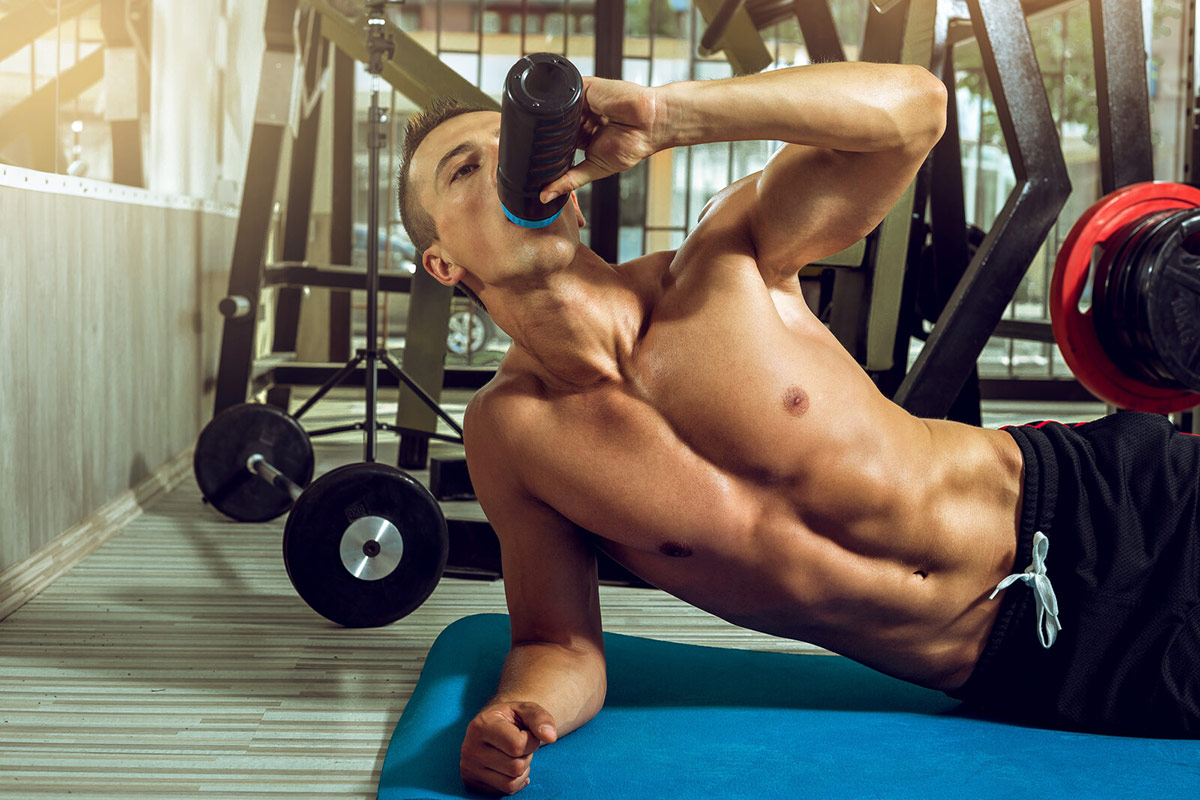Table of contents
If you work out, you need more protein than a person who spends most of their time sitting in a chair. Exercise breaks down muscle fibers at a microscopic level, and you need protein to help them repair.
Based on this, you might think you need to guzzle a protein drink after a workout to supply your body with extra protein, but do you?

© Can Stock Photo / Ozimician
How Much Protein You Need if You Work Out?
Guidelines suggest that a sedentary individual should get around 0.36 grams of protein per pound of body weight. However, depending on the intensity and duration of your workouts, you may need up to twice that amount.
So, if you weigh 150 pounds and do intense workouts most days of the week, you might need as much as 0.72 grams of protein per pound of body weight each day. That would be around 108 grams of protein. If you do lighter workouts or work out less often, you may only need 30% more protein than a sedentary person does.
If you consume 30 grams of protein with each meal, whether it’s animal or plant-based, you’ve almost met your protein needs based on this formula. It’s also a good idea to eat a snack that contains carbohydrates and protein in about a 3 to 1 ratio after a workout. So, you’ll get the rest of the protein from a post-workout snack. That protein doesn’t have to come in the form of a protein drink, though.
More Isn’t Always Better!
Research shows that the human body doesn’t absorb an unlimited amount of protein at one time. In fact, the limit it can absorb is 20 to 30 grams at a single meal or snack. Therefore, there’s no need to guzzle a drink that’s super high in protein after a workout. However, there are some reasons to consume protein after a workout. Studies show that doing so may boost muscle recovery and there’s some evidence that protein within a few hours of a workout reduces muscle soreness.
However, your muscles also need carbohydrates after a workout since repeated muscle contractions deplete muscle glycogen stores, the muscle’s energy source, and they need to be replenished for your muscles to fully recover. That’s why dietitians recommend consuming carbohydrates to protein in a 3 to 1 ratio after a workout.
The problem with protein shakes is that most are processed and contain little fiber. In contrast, if you eat a whole food snack that contains carbohydrates and protein, you will get some fiber, along with other beneficial components like antioxidants. Examples of snacks that contain enough protein and carbohydrates to help your muscles recover include:
- A peanut butter sandwich
- Greek yogurt with fruit
- Almond butter on whole-grain crackers
- A bowl of oatmeal with nuts or seeds
- Cottage cheese and fruit
The Pros of Protein Shakes
There are some benefits to drinking a protein shake too. They’re convenient, and if you pick a protein shake that contains whey protein, the amino acids from the protein are absorbed quickly after a workout. Some research suggests there’s a window period of about an hour right after a workout where you can optimize muscle repair and growth by consuming protein.
Other research suggests that this window period is longer and you don’t have to guzzle down a protein shake right after a workout to maximize muscle growth and repair. It’s more the total amount of protein you consume that matters rather than the timing.
Another advantage of consuming a protein shake that contains whey is research shows whey protein can boost immune function. Consuming whey protein may help your immune system function at its peak, even when your muscles are exhausted.
Another advantage of a protein shake is they usually contain branched-chain amino acids (BCAA) Studies show that BCAA turns on the muscle repair machinery by activating a pathway called the mTOR pathway. One BCAA called leucine is vitally important for turning on muscle protein synthesis.
Read also “Naked Nutrition: I tested the Chocolate Chip Protein Cookies!”
The Bottom Line
Do you need a protein shake after a workout to maximize muscle gains? You do need protein and carbohydrates, but it doesn’t have to be in the form of a protein shake. In fact, whole food sources are better for you than a processed protein supplement.
But if convenience is an issue and you don’t have time for a meal or snack, a rapidly absorbed source of protein like a shake that contains whey protein is an option. You’ll also get the benefits of the branched-chain amino acids that many protein shakes contain.
References:
- Ha E, Zemel MB. “Functional properties of whey, whey components, and essential amino acids: mechanisms underlying health benefits for active people (review).” Journal of Nutritional Biochemistry, 14(5), 2003: 251-258.
- Nemet D, Wolach B, Eliakim A. “Proteins and amino acid supplementation in sports: are they truly necessary?” The Israel Medical Association Journal, 7(5), 2005: 328-332.
- American Dietetic Association (2009). Nutrition and athletic performance. Medicine & Science in Sports & Exercise, 41, 3, 709-731.
- J Int Soc Sports Nutr 2008 Oct 3;5:17. doi: 10.1186/1550-2783-5-17.
